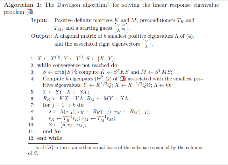Efficient block preconditioned eigensolvers for linear response time-dependent density functional theory
- Lawrence Berkeley National Lab. (LBNL), Berkeley, CA (United States). Computational Research Division
- Pacific Northwest National Lab. (PNNL), Richland, WA (United States). Environmental Molecular Sciences Lab.
Within this paper, we present two efficient iterative algorithms for solving the linear response eigenvalue problem arising from the time dependent density functional theory. Although the matrix to be diagonalized is nonsymmetric, it has a special structure that can be exploited to save both memory and floating point operations. In particular, the nonsymmetric eigenvalue problem can be transformed into an eigenvalue problem that involves the product of two matrices M and K. We show that, because MK is self-adjoint with respect to the inner product induced by the matrix K, this product eigenvalue problem can be solved efficiently by a modified Davidson algorithm and a modified locally optimal block preconditioned conjugate gradient (LOBPCG) algorithm that make use of the K-inner product. Additionally, the solution of the product eigenvalue problem yields one component of the eigenvector associated with the original eigenvalue problem. We show that the other component of the eigenvector can be easily recovered in an inexpensive postprocessing procedure. As a result, the algorithms we present here become more efficient than existing methods that try to approximate both components of the eigenvectors simultaneously. In particular, our numerical experiments demonstrate that the new algorithms presented here consistently outperform the existing state-of-the-art Davidson type solvers by a factor of two in both solution time and storage.
- Research Organization:
- Lawrence Berkeley National Lab. (LBNL), Berkeley, CA (United States). National Energy Research Scientific Computing Center (NERSC); Pacific Northwest National Lab. (PNNL), Richland, WA (United States)
- Sponsoring Organization:
- USDOE Office of Science (SC), Basic Energy Sciences (BES); USDOE Office of Science (SC), Advanced Scientific Computing Research (ASCR); Ministry of Education, Youth and Sports (Cambodia); USDOE Office of Science (SC), Biological and Environmental Research (BER)
- Grant/Contract Number:
- AC02-05CH11231; AC02-05CH1123; KC-030106062653; AC05-76RL01830; AC05-76RL1830
- OSTI ID:
- 1425428
- Alternate ID(s):
- OSTI ID: 1395271; OSTI ID: 1576835
- Report Number(s):
- PNNL-SA-114405; ark:/13030/qt8rf6x4kg; TRN: US1802105
- Journal Information:
- Computer Physics Communications, Vol. 221, Issue C; ISSN 0010-4655
- Publisher:
- ElsevierCopyright Statement
- Country of Publication:
- United States
- Language:
- English
Web of Science
S
|
journal | January 2018 |
A FEAST Algorithm for the Linear Response Eigenvalue Problem
|
journal | August 2019 |
Similar Records
A High Performance Block Eigensolver for Nuclear Configuration Interaction Calculations
Parallel eigensolver for H(curl) problems using H1-auxiliary space AMG preconditioning









